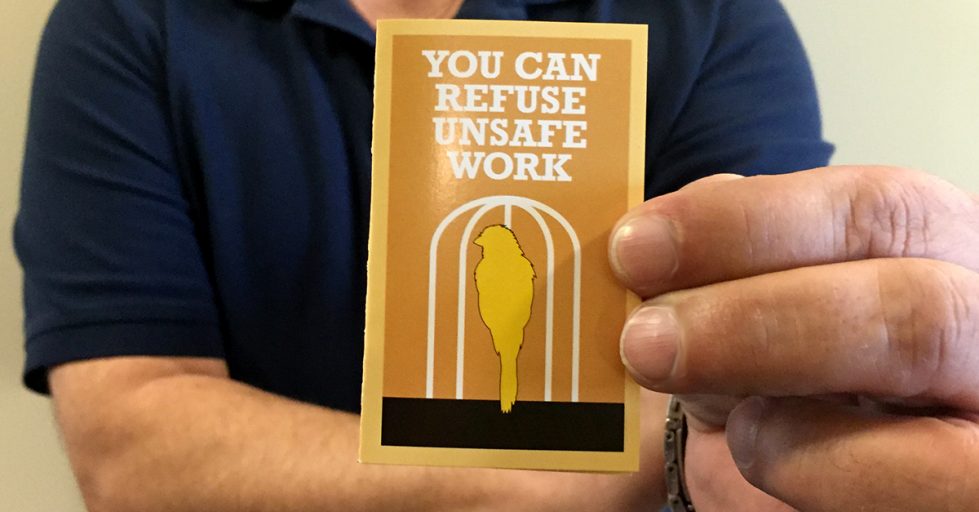Right to Refuse
CUPE has been receiving many questions from members who want to know how the current COVID-19 pandemic may affect their right to refuse. As a worker in Newfoundland and Labrador, you have the legal right to refuse unsafe work, according to Section 45 of the Occupational Health and Safety Act, when there are reasonable grounds to believe that the work, tool, or equipment is dangerous to you or another person’s health and safety.
Here’s how you can refuse unsafe work:
- Notify your supervisor or employer at the worksite and state your reason for refusal.
- If you are not satisfied with the remedy, ask the occupational health and safety committee or the worker health and safety representative to investigate.
- If the matter is still not resolved to your satisfaction, you can report your concerns to the government’s Occupational Health and Safety Division or an officer, either in writing or orally.
- After a ruling is made, legally you must return to work but may appeal the order within 7 days.
You cannot be discriminated against through dismissal, discipline, or reduction of either wages or benefits for complying with the legislation, according to Section 49 of the Act.
How does COVID-19 affect the potential that an aspect of the work may be dangerous to the workers’ health and safety?
For employees who are not working with people who are ill or showing symptoms of illness (such as fever and a cough) COVID-19 is not a significant risk to a worker. While the risk to public health remains high, the risk to the health and safety of individual workers is not significantly impacted at this time. The ability to evoke your right to refuse is individual and based on your own assessment of the risk. Consider factors such as ability to maintain hand hygiene and a safe distance from anyone who is exhibiting symptoms.
How does COVID-19 affect the potential that an aspect of the work may be dangerous to the workers health and safety when working with people who are infected or showing symptoms of illness?
If you work in health care or any sector that brings you into contact with individuals who are ill or suspected to be ill, ensure you are familiar with your employer’s infection prevention and control procedures. If you lack the training, staffing levels, or personal protective equipment they call for to perform the tasks you have been assigned, please take those factors into consideration when evaluating the risks. As always, the determination that a situation is dangerous is an individual one and the role of your union is to ensure members are aware of their rights and the processes to follow.
It is also important to remember that the efforts to enhance health and safety in your workplace are always ongoing, and any situation that can affect the health and safety of any person in the workplace should be reported immediately to a supervisor.
Provincial Government COVID-19 Update
The Government of Newfoundland and Labrador has taken the extreme measures of closing all schools and child care centres and postponing all non-urgent hospital appointments and surgeries. The College of the North Atlantic is also closed. Visitors are banned from hospitals, with the exception of children, women giving birth and end-of-life patients.
More details available on the CBC website:
https://www.cbc.ca/news/canada/newfoundland-labrador/covid-19-march-16-nl-schools-1.5498831
CUPE MATTERS
CUPE offices in St. John’s and Corner Brook are now closed with staff working remotely from home. You may still call the CUPE offices as our phone system operates through Skype.
CUPE NL executive board will be making a decision soon regarding Provincial Convention. The executive will continue to meet, through weekly conference calls, as the ever-changing situation around COVID-19 unfolds.
Stay safe and be well.

